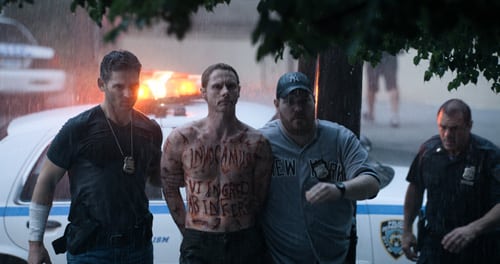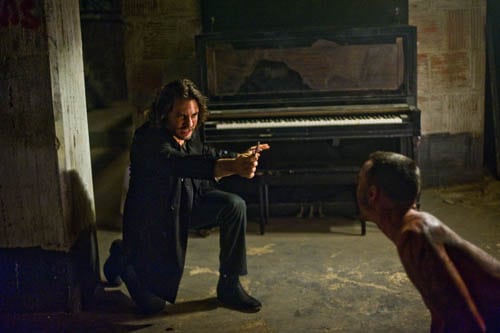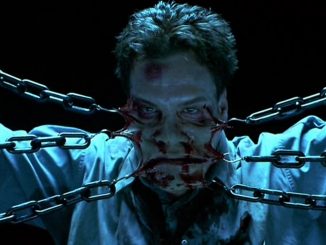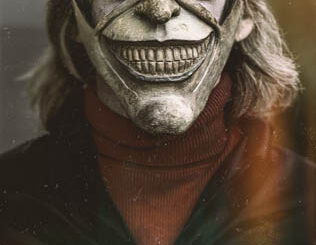To celebrate the DVD and Blu-Ray release of DELIVER US FROM EVIL in the UK, we’ve got an exclusive interview with the film’s director and co-writer, Scott Derrickson.

When did you first hear about the book ‘Beware The Night’ by Ralph Sarchie?
I first heard about the book in 2004. Shortly after Jerry Bruckheimer had optioned it, I was hired to write the script. I was not involved at that point as a director, but I did spend a few days with Ralph Sarchie. During my time with him in New York, he gave me the non-fiction book about Anneliese Michel that became The Exorcism of Emily Rose. So if I hadn’t met Ralph, I wouldn’t have made that movie. Then, 9 years later, Clint Culpepper at Screen Gems, asked me what I wanted to do next, and I had told him that I had always wanted to make this movie that I wrote for Jerry. So Clint read the script, loved it, and now I’m making it.
It’s the same script?
No, it’s not the same script. I wrote the original draft in 2004, but there were three other writers that did a bunch of drafts after that. David Ayer did the biggest rewrite, then Brian Bertino did a rewrite, and also Bruce Mckenna did a rewrite. Screen Gems wanted to make my original draft, not any of the rewrites, but when I actually re-read it, I knew it still needed a lot of work. For starters, it needed to be updated. Emily Rose was the first really popular possession/exorcism film in decades, but since then we’ve seen a resurgence in the sub-genre. So re-reading my original script for this film, I didn’t feel it was fresh enough. So I did a major overhaul of the script, including a few small things from the other writers’ drafts. That new draft seemed to really hit the target, and is so much better than the original draft. That’s the version we are making.
You did The Exorcism of Emily Rose, about possessions and demons, so what did you change with this movie?
The possessed characters in this movie are different than those we have seen in possession movies before – it’s not the same old stuff. The possessed in this film are different – they are more calculating and more purposeful, which I think is pretty interesting.
You are shooting in all these places that showcase this darker, wetter Bronx that we don’t really get to see daily. So what was it about this imagery that you wanted to capture?
There is no place in the world like The Bronx. I have travelled a lot in my life, and I know New York pretty well – and nothing is like The Bronx. It has its own textures and history and there is a vibrant, dangerous quality to it. It’s just so dark and dank and cramped, and in the heat of the summer months, there’s a kind of menace to it. There’s an odd, dark visual beauty to all the labyrinthine alleyways with dark fire escapes, and the people who live there are as distinctive and as interesting as the look. It’s just very alive, that place – it’s not a dead place at all. The four-six, where Sarchie was an undercover special ops cop for many years was called “the most dangerous square mile in America” by the FBI, because that area had more violent crimes and more arrests than any other precinct in the country. Sarchie is a hardcore Bronx cop, a really hardcore guy in so-many ways, and that was a part of what makes this story so compelling – not just the gritty dangerousness of the Bronx, but the gritty dangerousness of a guy who fights the worst of the worst there. And yet, he’s such a good guy, and he protected a lot of good people in that area. The Bronx isn’t just a place where crimes happen, most people simply live there. And this story isn’t about your typical Bronx thugs, it’s definitely about something scarier than that. The paranormal menace in this story victimizes a lot of decent people, which drives Sarchie to help them.
So can you tell us what we were looking at today? Which scene were you shooting?
The scene today was with Eric Bana and Joel McHale who are police partners. They are looking at security camera footage of a bizarre crime being committed, and while reviewing the footage, Sarchie sees something entirely unexpected.
Is there any movie which inspired you for this film?
Jerry (Bruckheimer) is a very smart guy, and there’s a simple genius to the way he thinks. When he approached me about writing the original script, he said he wanted to make “Serpico meets The Exorcist” (laughter) and when I heard that, I thought, “that’s the greatest idea I ever heard.” (laughter). To combine a classic possession story with a classic cop procedural is a simple and brilliant idea. As we’ve worked on the film, it’s become a bit more of “Se7en meets The Exorcist” though – it’s a possession/exorcism film, but also a dark, violent thriller.

Is this more a thriller or a horror movie?
There are a lot of scary moments in it – so there’s definitely horror moments in it – but truthfully, it really rides the line right in-between the two. It’s not a straight-up horror film like Sinister. And I think Emily Rose was even more of a horror movie than this film. I think this is more of a thriller. A mystical cop thriller with some real shocks and scares. It’s got moments of real graphic violence in it, but the graphic violence isn’t what’s scary, it’s what’s behind the violence that’s scary.
Was it kind of hard to bring in the cast that you did, because they are a very exceptional cast.
Yeah. You know, none of these actors were an easy sell. Eric in particular is very picky about what he does, so I met with him several times. He was the guy I really wanted though, the way he is with accents, and the quality that he brings to larger-than-life characters – it’s exactly what I was looking for. There’s a gravity to Bana, and watching him do Ralph Sarchie better than Ralph Sarchie – it’s just so great. And then Edgar Ramirez was the second real significant role to find, and once I locked in on Edgar, I honestlly didn’t think anyone else could do it. Getting Edgar to commit was a long process – he said no the first time he read the script, because he felt that the role was too simple and too traditional, and I very much agreed with him. So after he passed on the role, I asked him to meet with me, because at the very least I wanted to pick his brain about what was missing from the character. Mendoza is not a typical white American or European priest, and there’s a different cultural quality to Priests and specifically Jesuits in Latin America. Speaking to Edgar, he told me about one of his closest friends who is a Jesuit Priest and we started talking about Priests with real back stories – guys who have dark histories, and guys who have personal demons. We both agreed that many of the deeply religious people that we have known in our lives are not stereotypes at all. They are not the kinds of people you see represented in movies. So Edgar and I started to bond over the idea of creating a very real but very atypical character.
Over the course of several lunches, Edgar helped me completely re-invent the character of Mendoza – and only after I actually rewrote the role and showed it to him did he agree to play the character. But what’s funny is that I myself wasn’t even sure I was going to make the movie because I was so unhappy with that character, but after my second lunch with Edgar, I called the studio and I said, “I am definitely making the movie, because now I know how to rewrite this character whether Edgar does it or not.” And then thankfully, Edgar did decide to do it. And he is just one thousand percent committed to the movie. He is doing an extraordinary job, and you will see, not only is he a priestly, religious character, he is complex and real. And the way he deals with this phenomenon of possession and exorcism – it’s a real thing in the real world, it happens all the time. You may not believe in demons, but exorcisms are a fact. And what’s interesting to me about all of this is that regardless what you think is behind possession and exorcism sociologically or anthropologically, it does occur across all cultures and always has. And if you really look into some of the more credible cases, it is just so fascinating. I think we are trying to capture some of that fascination, and Edgar is bringing something truly amazing to that process.
So we just met Joel and I know you were friends with him and so was it difficult for you to kind of convince the studio to have him? Because we primarily have seen him in comedies on TV.
Nobody really got the idea of casting Joel as a badass cop, even though I wrote the role (of Ralph Sarchie’s undercover police partner) for him. During the script phase, I was having trouble making the role interesting and making the role work, and it started working only when I started writing it specifically for Joel. I’ve known Joel for many, many years, he’s not like his TV personality, he is a different guy. He’s certainly as funny as his TV persona, but there is also a dangerousness to Joel. A crazy streak. He’s huge too – 6’4” and super fit. He was a tight end for the University of Washington. There is a violence to him that I’ve seen up close. They studio kept suggesting other people that I would turn down, knowing that eventually they would have to reckon with the fact that I actually wrote it for Joel. Eventually, both Clint Culpepper and Jerry Bruckheimer decided to trust me, that I knew Joel would knock the role out of the park. But they also saw we needed some humor in the movie, somebody who could bring some moments of levity, so they certainly saw Joel’s value in that respect. Then after meeting with Joel, started to get it, and now everyone is so glad that we got him. It was a leap of faith for them, but now they keep saying to me, “Oh you were totally right about Joel.” (laughter)

If this does well, it’s like one of those things where these characters are going to come back again. I know you are shooting a film, but in the back of your mind are you thinking about it?
Oh, it’s not in the back of my mind, that’s always been the intention with this one – to create a franchise. I am planning on it and so is the studio. Everybody thinks that this will have sequels.
And do you think you are going to be involved with future projects?
Oh yeah. Absolutely. I love these characters. I mean that’s why I’m doing it. I am not doing it for the money, and I am not doing it because it’s just another scary story, I am doing it because these characters are amazing characters. And they are characters that I would love to see continue to evolve and find their way in other mysteries.
Because you kind of work-shopped the character with Edgar Ramirez, did you do the same with Eric then or was that character much more fully realized?
That character was much more fully realized, because I have known Ralph Sarchie now for ten years. I really feel like I got Ralph on the page. And when I met with Eric and I was able to talk to him more about who the real Ralph Sarchie was – with that blue collar Queens accent, that inner hostility, that kind of caged animal quality – I knew that Eric understood and would know how to play that. I think that Eric tapped into Sarchie’s extreme qualities and then brought other complex dimensions to the role that flesh him out into a fully formed movie character. He’s the kind of character that we saw in 70s movies – characters like Popeye Doyle in The French Connection, or Pacino’s Frank Serpico. Do you like him? Yeah you like him – but not because he’s likable. You like him because he’s so damned interesting, and because he’s so unexpected in so many ways. That’s the kind of character Ralph Sarchie is. He’s not an empathetic, everyman kind of character. He’s his own man alone. One of a kind.
DELIVER US FROM EVIL is available on DVD and Blu-Ray now.





Be the first to comment